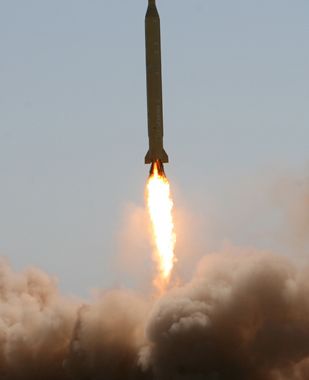Iran missile tests draw criticism
Western nations and Russia voice concern after Tehran fires two missiles with 2,000km range.

Robert Gibbs, the White House spokesman, said that the tests were consistent with the “provocative nature with which Iran has acted on the world stage”.
He urged Tehran to allow “unfettered access” to its nuclear facilities and said there was an “international consensus” to address the issue
‘Worrisome’
Russia’s foreign minister, Sergey Lavrov, also voiced concern about the missile tests.
“Of course it is worrisome when missile launches happen against the backdrop of an unresolved situation concerning Iran’s nuclear programme,” Russian news agencies quoted him as saying.
Lavrov was speaking to Russian reporters in New York after meeting his Iranian counterpart, Manouchehr Mottaki, whom he said he urged to be “maximally co-operative” with the International Atomic Energy Agency (IAEA) in investigating the construction of a new uranium enrichment plant.
| in depth | |||
|
“We assume, that the Iranian side had heard us and we will see some kind of result of today’s meeting,” he said.
But Lavrov also said he was “convinced restraint is needed”, without elaborating, seeming to back up a source from his ministry who told Russian agencies earlier on Monday that Moscow wanted Western powers, seeking to introduce fresh sanctions against Iran, to exercise restraint.
“We should not give way to emotions now,” the ministry source had said. “We should try to calm down and the main thing is to launch a productive negotiations process.”
Iranian officials have said the Shahab 3, which was last tested in mid-2008, and the Sejil can both travel about 2,000km.
“Iranian missiles are able to target any place that threatens Iran,” Abdollah Araqi, a senior Revolutionary Guards commander, was quoted as saying by the semi-official Fars news agency.
The missile tests come at a time of increased tension after last week’s disclosure by the US – followed by Tehran’s admission – that it is building am erstwhile secret second uranium enrichment plant.
Military or sanctions
Alireza Ronaghi, Al Jazeera’s correspondent in Tehran, said: “There are two solutions about Iran: one would be sanctions and the other would be military action.
| in depth | |||||||||||||||||
|
“Iran is trying to prove that sanctions have not worked on the uranium enrichment programme. And as far as the military option is concerned, Iran is showing off missiles trying to say that a military option is not going to be viable; it’s not going to be a hit-and-run.
“Iran will retaliate and it will not just limit itself to the countries that have led those attacks; it will be a wide range retaliation. This is the message that Iran is sending.”
Marwan Bishara, Al Jazeera’s senior political analyst, said Iran was “making it clear that it will not accept any dictates from the United States or Europe”.
“As long as they are within the framework of the IAEA – as they see it – and within its so-called defensive doctrine, then it will simply go ahead and do what it needs to do and will leave the talking to take place in Europe,” he said.
“The Obama administration has made it clear all along that the military option is on the table… If the Obama administration does nothing, there is speculation here in the United States that Israel will take the lead and attack Iran,” he said.
Our analyst pointed out, however, that pursuing the military option “would lead to a major escalation in the overall region”.
Khaled Almaeena, the chief editor of Arab News, described the missile tests as “sabre-rattling” and said they did not pose an additional threat to Iran’s Gulf neighbours.
“I don’t think they [Bahrain and Qatar] should suffer from any sleepless nights … because any attack by Iran would result in total demolition of the whole state by the United States, which has the largest nuclear arsenal in the world,” he told Al Jazeera from Jeddah, Saudi Arabia.
However, Almaeena said that there were genuine concerns that Israel could launch a pre-emptive strike against Iran
“The extreme positions that the Israelis are taking … these are signs of dangerous days ahead,” he said.
“It is important that the Israelis realise themselves that if they try to do something they will open a hornet’s nest. This will maybe involve not just the whole region, but maybe the whole world, in an unnecessary war.”
Following Friday’s tests, Ahmad Vahidi, the Iranian defence minister, had warned Israel against any attack on the Islamic republic.
“If this happens, which of course we do not foresee, its ultimate result would be that it expedites the Zionist regime’s last breath,” he said in an interview broadcast on state television.
‘Notoriously inaccurate’
Iran stages regular military manoeuvres in the Gulf, showcasing its long- and medium-range missiles as well as other weaponry.
Theodore Karasik, a defence analyst based in Dubai, told Al Jazeera: “The range [of the missiles], of course, is critical and if they decide to fire the missiles, they would be able to hit various targets based on their selected need.
“The question becomes the accuracy of these missiles, and the earlier series of these Shahabs were notoriously inaccurate. In military parlance, that’s called ‘circular error probability’. This raises the issue of the sophistication of Shahab 3.”
Javier Solana, the European Union foreign policy chief, said that the missile tests placed the October 1 meeting over Iran’s nuclear programme “in a new context”.
Western powers, along with Israel, suspect Iran wants to use its nuclear technology to make weapons but Tehran says it just wants to generate electricity for civilian purposes.

